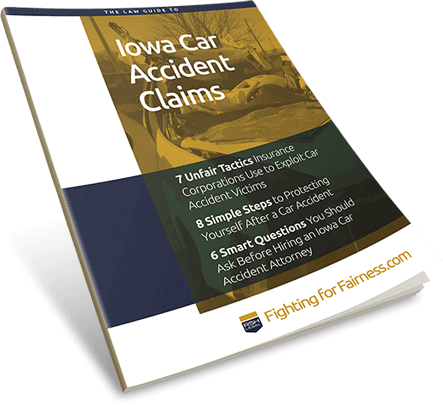After a crash, most people expect their auto insurance company — or the other driver’s insurer — to step in, handle the claim fairly, and pay what’s owed. Unfortunately, that’s not how it usually works.
Whether you’ve been in a regular car accident or a collision with a semi-truck, insurance companies are motivated to protect their own bottom line. They often look for ways to delay, reduce, or deny your payout.
Below are three common tactics insurers use after an Iowa car crash, along with important considerations if a semi-truck is part of the accident.
1. Pushing for a Recorded Statement
Soon after the accident, an insurance adjuster might contact you asking for a recorded statement. They may say it’s just part of the process, but their real goal is to gather information they can use against you later.
Adjusters are trained to ask questions in ways that can make you seem uncertain, inconsistent, or even at fault. Even small wording choices can be twisted to reduce the value of your claim.
What to do instead: Politely decline to give a recorded statement until you’ve spoken with an attorney. Your lawyer can communicate directly with the insurer on your behalf, ensuring nothing is said that could harm your case.
2. Asking You to Sign a Medical Release Form
Another common move is requesting that you sign a blanket medical release. The insurer may claim they just need to confirm your accident-related treatment, but the release often allows them to dig into your entire medical history.
Why would they want that? Because if they find any prior injury or condition — even one unrelated to the crash — they might argue your current symptoms aren’t from the accident. This can be used to reduce or deny payment for your medical bills.
What to do instead: Only release medical information that’s directly relevant to your claim, and only after reviewing it with your lawyer.
3. Offering a Quick Settlement
A fast settlement offer might seem like a relief, especially if you’re facing mounting bills. But these offers are usually far less than what you truly deserve.
Insurance companies know you may not yet understand the full extent of your injuries, future medical needs, or lost wages. By settling early, they close the case before you can claim more compensation.
What to do instead: Never accept the first offer without legal advice. An experienced attorney can help calculate the real value of your case, including long-term costs and non-economic damages such as pain and suffering.
Your Own Insurance Company Isn’t Always on Your Side
It’s not only the other driver’s insurer you have to worry about — your own insurance company can also use similar tactics. Even if you’ve paid premiums for years, they have the same financial motivation to pay as little as possible.
This can be especially true if you need to file an uninsured or underinsured motorist claim. Your insurer may treat you more like an opposing party than a valued customer, scrutinising every detail to limit the payout.
When a Semi-Truck Is Involved
Semi-truck accidents bring added complexity. The injuries and damages are often more severe, and there may be multiple parties involved — the driver, the trucking company, the maintenance provider, and even the truck’s manufacturer.
Because the stakes are higher, insurance companies (both yours and theirs) may work even harder to minimise what they pay. They may question fault, dispute the extent of your injuries, or delay the process in hopes you’ll accept less.
Key considerations for semi-truck accidents:
- Bigger policies, bigger pushback: Commercial trucking policies can be worth millions, so insurers fight hard to avoid large payouts.
- Multiple adjusters: You may be contacted by more than one insurance company, each with its own agenda.
- Complex regulations: Federal and state trucking laws can affect liability and claims. Understanding these rules is important for building your case.
Steps to Protect Yourself After Any Serious Accident
Regardless of whether a semi-truck or passenger car is involved, the steps you take right after the crash can make a big difference in your claim’s outcome.
- Seek medical attention immediately. Even if you feel fine, some injuries take hours or days to appear. Medical records also serve as crucial evidence.
- Document the scene. Take photos of vehicle damage, injuries, skid marks, and road conditions. If there are witnesses, get their contact details.
- Report the accident. Notify your insurance company, but avoid giving recorded statements until you’ve spoken to a lawyer.
- Track all expenses. Keep copies of medical bills, repair invoices, and records of lost income.
- Get legal help early. A lawyer can handle communications, gather evidence, and protect your rights from day one.
Common Questions About Insurance Claims After a Crash
Can I sue my own insurance company?
In some cases, yes, especially if they act in bad faith by unreasonably denying or delaying your claim.
Do I have to talk to the other driver’s insurance adjuster?
No. You can direct them to your attorney. Anything you say could be used to reduce your payout.
What if I’m partly at fault?
Iowa’s comparative fault laws may still allow you to recover damages, but your percentage of fault could reduce the amount you receive.
Why Contacting an Iowa Car and Truck Accident Lawyer Can Make the Difference
Insurance companies, even your own, are focused on protecting their bottom line, not on ensuring you receive full and fair compensation. The sooner you involve a lawyer who understands Iowa’s accident laws and the tactics insurers use, the better your chances of securing a fair outcome.




